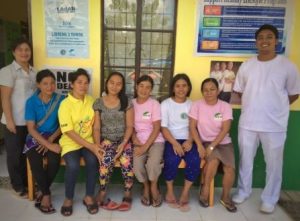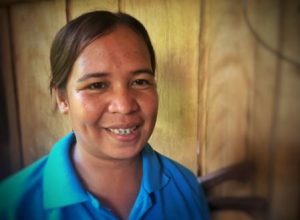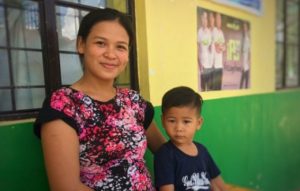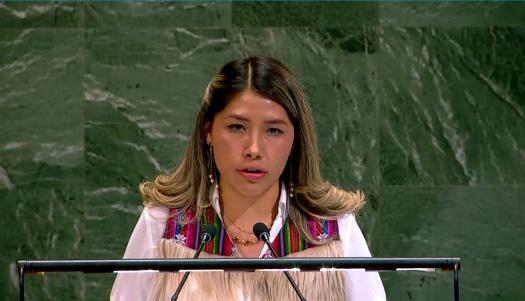Montevista, Philippines – For too long, childbirth was a lottery of life and death for many Indigenous women in the southern island of Mindanao.
For a majority of the island’s 18 Indigenous groups, pre-natal checks involved rituals of smoke, fire and prayer to ward off evil spirits, and with most babies being born at home without trained midwives on hand, mothers would hope and pray for no complications.
“Giving birth was scary,” recounts Gillian Albios, 25, from the Dibabawon Indigenous group in the mountain village of Camansi, who is now five months pregnant with her second child.
“I did want to get to a clinic, but I had to bounce along the road for over two hours on the back of a motorbike. That’s not what you need when you’re in labour.”
Just three years ago, Albios’ municipality of Montevista had one of the highest rates of maternal deaths in the Compostela Valley Province.
Yet with support from the Philippines’ Department of Health, the European Union and the United Nations Population Fund (UNFPA). a new health and birthing facility was established in Camansi in early 2015.
“After they set up here, I took up using birth control and started helping my husband earn money for my son’s school,” Albios says, as a nurse listens to the tiny heartbeat in her belly.
With a midwife, nurses and community health workers based permanently on site, Albios plans to give birth at the facility this time around.
“From a community of over 1500, we’ve had 16 births at the health station this year,” explains Nurse Sherwin Magbanua.
“Our health workers go door to door to check on people, teach them about healthy practices related to family planning, pregnancy and childbirth and refer them on if needed.”
With two new health and birthing facilities now fully staffed and equipped, Eutropio Jayectin, Montevista’s Mayor, says maternal deaths have fallen dramatically.
“With zero maternal deaths for nearly two years, we’ve moved from last to first in the province,” he says.
 Nurse Sherwin Magbanua (far right) and the team of Camansi community health workers.
Nurse Sherwin Magbanua (far right) and the team of Camansi community health workers.
Cultural sensitivity: “Our mantra and battle cry”
Maricel Nalangan, 34, is a leader, campaigner and traditional medicine maker from the Dibabawon Indigenous group in Montevista.
Working with Indigenous People’s organisations, she lobbies the local government for a fair allocation of resources, whilst making a small profit from selling traditional herbal remedies.
“I’ve been fighting discrimination all my life,” Nalangan says. “Not long ago, the tribes were seen as the lowest of the low, but thankfully, we have more respect now.”
Over 60 per cent of the 14 – 17 million Indigenous Peoples in the Philippines live in Mindanao, and when health, education and infrastructure investments were planned they were often the lowest priority.
Remote locations, mountainous terrain and years of conflict also made it hard to reach them with lifesaving services.
Yet the European Union and UNFPA funded Indigenous People’s Maternal Child Health and Nutrition project, actioned by the National Commission on Indigenous People and co-managed by UNFPA, makes the tribes a top priority.
“Thousands of Indigenous Peoples didn’t even have birth certificates before this project got going,” notes Cemellie Sabay, UNFPA’s project manager, “so they couldn’t access national health insurance, free healthcare, or get enrolled in schools – let alone get bank accounts and good jobs.”
“Yet over the past three years, we’ve helped over 10,000 get registered.”
According to Sabay, the project team also educates Indigenous leaders on reproductive health and gives out micro-loans for sustainable, culturally sensitive and money-making mini-businesses, like Nalangan’s herbal medicines.
“In everything we do, cultural sensitivity is our mantra and our battle cry,” she says.
 With support from the European Union, Maricel Nalangan now runs a money-making enterprise producing traditional herbal medicines.
With support from the European Union, Maricel Nalangan now runs a money-making enterprise producing traditional herbal medicines.
A better future
“We’re proud that in under three years, we’ve helped reach over 117, 000 people across Mindanao,” says Ambassador Franz Jessen, Head of the European Union Delegation to the Philippines.
“This is a great starting point in terms of boosting health and opportunities and making sure that the rights of indigenous Peoples are protected and respected.”
UNFPA Philippines Representative Klaus Beck says that the methods, lessons and successes should be taken up by the government and Indigenous organisations after the project ends in December 2016.
“With the significant drop in maternal deaths in places like Montevista, the greater health awareness among Indigenous groups and the huge number of new opportunities opening up for them, it’s crucial that local and national government, especially the National Commission of Indigenous Peoples and the Department of Health, build on and expand these efforts.”
“This project truly does put the ‘last person first,’ as called for in the vision of the 2030 Agenda for Sustainable Development, and this is something we must all keep striving for if we are to achieve a peaceful, prosperous and sustainable future for the Philippines.”
As for Gillian Albios in Camansi, her five year-old son Neo Jay is just starting school.
“I’ll keep managing my body after my second child is born, and I’ll decide if I have another in a few years. But for now I just want to make sure I do everything I can to make sure both my kids get every opportunity I never had.”
 Welcome to the United Nations
Welcome to the United Nations



